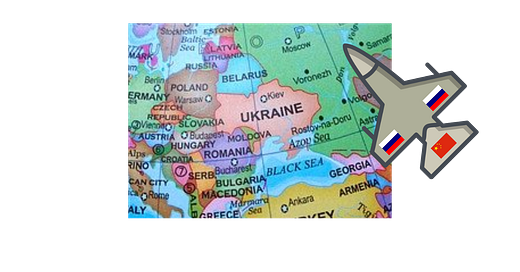Biden hopes to end China's embrace of Russia today. Expectations are low. -- China Boss update 3.18.22
Update
What happened.
The White House announced that President Biden and President Xi spoke for nearly two hours by phone today “about Russia's invasion of Ukraine and Chinese media.”
The Biden Administration has repeatedly warned China not to align with Russia and is signaling it's willing to use, both, a "sticks and carrots" approach to move Beijing towards consensus with the West on the war in Ukraine.
China Boss thinks Biden may have offered to soften U.S. trade measures against China in exchange for Xi's abandonment of "material" economic and military support of Putin. But Xi is likely to be wary of doing anything that would appear to undermine the China-Russia Strategic Partnership.
News outlets say their sources tell them that last Monday's meeting between U.S. national security advisor Jake Sullivan and Politburo member Yang Jiechi in Rome did NOT go well. If Biden didn’t make headway in his phone call with Xi today, Washington will start hitting China with Russia-type sanctions - and it wouldn’t be a matter of if, but when.
Why it matters.
Russia’s invasion of Ukraine
Tim Heath, a senior researcher for the RAND Corporation, told Euractiv that any military support China is likely to provide to Russia would be unlikely to change the outcome of the war in Ukraine. “Ultimately, it’s all Russian weapons and people fighting. And the Chinese bond is going to be extremely limited at most,” he said.
The impact of China’s economic support, however, could be greater, analysts say. Since Russia’s invasion, China has stepped up orders for Russian grain and coal, but there are questions as to how much more China is able and willing to do there, too.
China is already Russia’s largest trading partner, with bilateral trade soaring 36 percent in 2021 to a record $147 billion. Within hours of Russian tanks rolling over the border into Ukraine, China’s customs administration lifted restrictions on Russian grain imports. That decision followed an announcement last month that China was in negotiations to seal an estimated $20 billion deal to purchase 100 million tons of Russian coal.
“Russia is counting on China to supply a wide range of consumer and industrial goods, and to buy wheat, corn, sunflower oil, metals, and above all oil and gas,” said GARY HUFBAUER, former U.S. Treasury department deputy assistant secretary for international trade and investment. “Current estimates suggest Western sanctions could cost Russia a 10 percent drop in GNP. I think the absence of Chinese support could cost Russia another 2 percent.”
Strategically, Biden’s talk with Xi today is a way to “raise the stakes” for China by giving it an “ultimatum,” political analyst Wu Qiang said. By demanding Beijing choose sides, the U.S. also raises global, and, more specifically, European, awareness in hopes of persuading allies to “rethink” their China ties.
If China does back Russia in its showdown with the west, the Biden administration will shift its focus to persuading allies, in Europe particularly, to rethink their relationships with Beijing. Sullivan is due in Paris on Tuesday for discussions with the French government.
“The United States believes that the key here is a careful process of dialogue and discussion with Europe about what China is revealing about its global policies and priorities,” the US official said. “Our goal basically is to carefully engage China, letting the Europeans know [what we are doing] all along, but if it becomes clear that [China] is moving in another direction, so be it.”
Taiwan
But the bigger challenge that lies ahead is the possible conflict with China over Taiwan. China’s so-called “neutrality” risks, not only secondary sanctions, but new ones imposed by the West for backing a war criminal. That begs the question of why China might refuse to abandon an insignificant trading partner for its larger ones.
China’s anti-sanctions position willfully ignores its economic leverage on Russia.
There’s only one reason President Xi would risk a near total blockade of trade with the U.S. and Europe by supporting Putin’s attack on Ukraine, and that’s because he sees opportunity for an alliance with Russia down the road, or an advantage to be had in the distraction and thinning of resources that could be used to defend Taiwan.
We are now at a point where “the world faces the possibility of a dramatic shift in the geopolitical balance of power as Beijing mulls support for Russia over the Ukraine war,” The Guardian’s world affairs editor Julian Borger said. President Xi has seven months before the party congress in November to weigh the odds of whether an attack on Taiwan could help secure his position as China’s top leader for life. With the economy tanking and his Covid-Zero failures exposed by the many rampant Omicron outbreaks that are, presently, spreading like wildfires across the country, Xi may come to rely on Putin if he rolls that die.
They said it best.
China has already decided to send economic aid to Russia in Ukraine conflict, US officials fear (Julian Borger, The Guardian)
The Guardian:
There is pessimism in Washington about the possibility of steering China away from throwing in its lot with Russia, largely because it sees the partnership as being driven from the top.
“It really is a project of Xi Jinping. He is totally, fundamentally behind this closer partnership with Russia,” the US official said. There is more scepticism lower down the ranks, but Xi and Putin have bonded over their shared view of the US as being heavy- and high-handed, and determined to end the period of US global dominance.
****
See you Monday.





